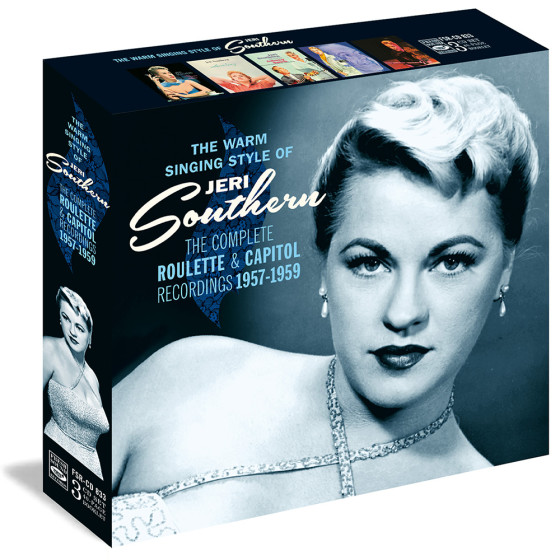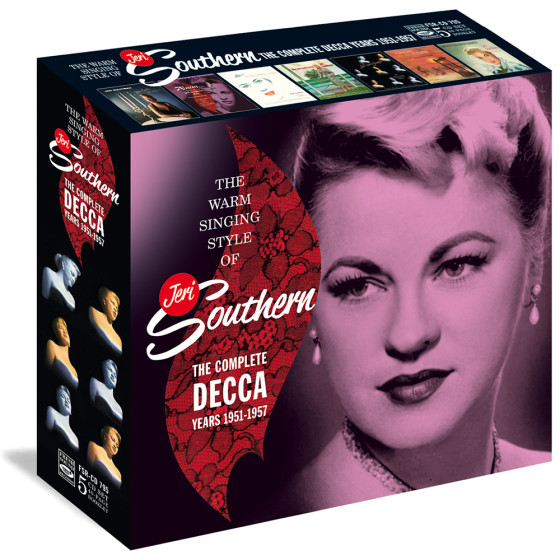No products
Jeri Southern
The Warm Singing Style Of Jeri Southern: The Complete Roulette & Capitol Recordings 1957-1959 (3-CD Box Set) Digipack Edition
Fresh Sound Records
Personnel:
Jeri Southern (vcl & p), Sy Oliver, Lennie Hayton, Marty Paich, Billy May, Bob Thompson (orch), Johnny Smith (g)
Reference: FSRCD 833
Bar code: 8427328608336
This 3-CD set contains all recordings by Jeri Southern that the Roulette and Capitol labels released on albums and singles between 1957-1959. Also includes a 40-page booklet including biography, rare photos, and complete discography (matrix & catalog numbers, personnel, location and recording date).
All tracks in this collection appear in chronological order of recording. A total of 65 songs performed in Jeri's warm and inimitable singing style. As a bonus, the set also includes four bonus tracks recorded by the singer during two of her appearances in the TV show Stars of Jazz.
________________________________________________________
Sophisticated, witty, charming and always distinctive and arresting, Jeri Southern was a singer equally at home in an orchestral setting as she was in the intimacy of a small group. That she could also bring a rare sensitivity and considerable interpretive range to both settings is amply displayed in this collection, which includes the five albums and all the rare singles she recorded for Roulette and Capitol, as well as two dazzling TV performances.
Both labels ensured only the best worked with her; arrangers like Sy Oliver on the first four tunes, and Lennie Hayton, who contributed the apt, lush backgrounds for the fine ballad interpretations of Coffee, Cigarettes and Memories, while on Southern Breeze, a warm and evocative Jeri responds to the solidly swinging settings provided by arranger and conductor Marty Paich and the pertinent contributions of such great West Coast jazzmen as Don Fagerquist, Bob Enevoldsen, Herb Geller, Georgie Auld, and Mel Lewis.
Her art could also flourish in the intimacy of the small group. Both Meets Johnny Smith, with the great jazz guitarist, which was her last album for Roulette, and At The Crescendo, her last for Capitol, gave her the kind of context in which she first attracted attention. In a situation indelibly associated with her she delivers a series of virtually faultless performances.
But it is perhaps her reaction to the utterly contrasting demands of Meets Cole Porter that reveals her range conclusively. Billy May supplied a series of witty scores, matched by Southerns joyous, exuberant readings of some of the most brilliantly sophisticated songs Porter ever wrote. In these stellar performances she showed an appreciation of the material that, like her art, remains undimmed by time.
Tracklist
Disc 1
Disc 2
Disc 3
CD 1
Orchestra Conducted by Sy Oliver (45 rpm singles)
01. Just When Were Falling In Love 2:48
02. Life Does a Girl a Favor 2:33
03. Were Not Children 2:31
04. Oh Sure I Do 2:28
Orchestra Conducted by Lennie Hayton (LP)
05. Deep in a Dream 2:59
06. This Time the Dreams On Me 2:33
07. Spring Will Be a Little Late This Year 3:15
08. I'm Stepping Out with a Memory Tonight 2:58
09. I'll Never Be the Same 2:19
10. I Must Have That Man 3:11
11. Yesterdays 2:31
12. Coffee, Cigarettes and Memories 2:49
13. Yesterdays Gardenias 2:27
14. The Song Is Ended 2:02
15. Maybe I Love You Too Much 2:21
16. Detour Ahead 2:43
Orchestra Conducted by Marty Paich (LP)
17. A Warm Kiss and a Cold Heart 2:53
18. Who Wants to Fall In Love 3:13
19. Then I'll Be Tired of You 3:46
20. Isn't This a Lovely Day? 2:57
21. He Reminds Me of You 3:12
22. Are These Really Mine? 3:39
CD 2
Orchestra Conducted by Marty Paich (LP)
01. Ridin' High 2:18
02. Crazy He Calls Me 3:45
03. Porgy 3:34
04. Down with Love 3:10
05. Lazy Bones 3:04
06. I Like the Likes of You 2:52
The Johnny Smith Quartet (LP)
07. Robins and Roses 2:04
08. Without a Word of Warning 3:18
09. Ungrateful Heart 3:19
10. Isn't It Romantic? 3:00
11. Music, Maestro, Please 3:08
12. Two Sleepy People 3:12
13. Where or When 3:49
14. When the Sun Comes Out 2:58
15. Until the Real Thing Comes Along 4:27
16. The Things I Love 3:56
17. Shake Down the Stars 2:23
18. Have You Forgotten So Soon? 3:42
Bonus tracks:
From the TV Show Stars of Jazz
19. I Hadn't Anyone 'Till You 1:31
20. Something I Dreamed Last Night 3:58
21. Ive Got Five Dollars 1:21
22. He Was Too Good to Me 3:05
CD 3
Orchestra Conducted by Billy May (LP)
01. I Concentrate On You 3:45
02. Get Out of Town 3:02
03. Which 2:38
04. After You 2:47
05. It's All Right with Me 4:42
06. Why Shouldnt I? 2:27
07. Looking at You 2:29
08. Weren't We Fools? 2:46
09. It's Bad for Me 2:10
10. You're the Top 2:46
11. Let's Fly Away 2:28
12. Don't Look at Me That Way 2:55
Orchestra & Chorus Arranged and Conducted by Bob Thompson (45 rpm singles)
13. Run 2:06
14. Señor Blues 1:46
15. Take Me Back Again 2:13
Jeri Southern At the Crescendo (LP)
16. I Thought Of You Last Night 2:31
17. I Get a Kick Out of You 3:41
18. Dancing on the Ceiling 3:42
19. Blame It On My Youth 3:26
20. Remind Me 4:24
21. You Better Go Now 2:34
22. I'm Just a Woman 3:23
23. Something I Dreamed Last Night 4:41
24. Nice Work If You Can Get It 1:55
25. When I Fall In Love 3:16
Album details
Jeri Southern vocals in all tracks, with orchestral or rhythm accompanimentAll tracks recorded in New York or Los Angeles and originally issued as 7" EP or albums in Roulette, Calliope and Capitol Records.
Roulette albums [CD 1 & 2 · 1957-1958]
-Coffee, Cigarettes and Memories (R-25039)
-Southern Breeze (R-52010)
-Meets Johnny Smith (SR-52016)
Capitol albums [CD 3 · 1958-1959]
-Meets Cole Porter (ST-1173)
-Jeri Southern At The Crescendo (ST-1278)
The Roulette recordings were originally produced by Hugo & Luigi. Capitol sessions by Tom Morgan. Stars of Jazz performances produced by Jimmie Baker
Compiled and produced for CD release by Jordi Pujol
© 2014 by Fresh Sound Records
Hi Fi / Stereo · Digitally Remastered
Blue Moon Producciones Discograficas, S.L.
Press reviews
"In the late summer of 1957, Jeri Southern ended a happy association with Milt Gabler at Decca and signed with the new and up and coming Roulette label. They had Joe Williams, Pearl Bailey and Count Basie on their list and she maybe thought that a fresh, lively new record company would help her career. This three-CD box set collects together all of the music she recorded for Roulette and later Capitol Records, comprising five LPs and six EPs. The first four tracks on CD one are with Sy Olivers orchestra and find Jeri in contemplative mood as she rides smoothly on the beat provided by the big band.
Her first Roulette LP, with Lennie Haytons orchestra providing rich backing, finds her doing what she always did best, singing in a warm, intimate manner, mostly at medium to slow tempo. Deep In A Dream emphasises the warmth and clarity of her delivery and she tells a story on the somewhat esoteric This Time The Dreams On Me. Yesterdays is a good example of the way she could tell a story and bring the lyrics of songs to life.
The Southern Breeze LP finds her with Marty Paich providing the orchestral backing, crisp, swinging and with solos interspersed by Herb Geller on alto and Georgie Auld on tenor. With this sort of backing Jeri shows how easily she could swing with a good band behind her without in any way sacrificing that sweet, ripe voice. Although most of her music was delivered in medium or slow tempi, it always had that personal, talking to you quality that made every listener think her music was for them alone. Even on the rare occasions when she cuts loose, like on Ridin High, the warmth and clear diction are in evidence.
Proving that she was just as competent and content with a small combo, Jeri sings 12 tracks with Johnny Smiths quartet in her usual relaxed, melodic manner. Smith adds supportive and occasionally bluesy solos. Back to the big band though with her first Capitol LP where she tackled the music of Cole Porter: its good stuff but often a test of how good a singer is in the way she manages to interpret the material. Jeri Southern has no trouble at all with Get Out Of Town, Its All Right With Me and the rest of the tunes with Billy Mays orchestra giving solid support. She also brings to life some of Porters lesser-known works like Which and After You.
Helping to give good value are the singles and there are particularly good versions of Horace Silvers Señor Blues and Take Me Back Again. A very slow Its All Right With Me is unusual and unexpected but she manages to make it another personal triumph.
The final 10 tracks were recorded at the Crescendo club in Hollywood and present Jeri with a quartet featuring cello, piano, bass and drums and demonstrate once again her ability to make any space she worked in her own and to communicate directly with an audience. There is more Cole with her lightly swinging version of I Get A Kick Out Of You and a soft-focus reading of one of her early hit songs, You Better Go Now. In many ways this was one of her best recorded sessions although sadly, it was to be her last. A gentle, communicative singer with no histrionics but a very personal approach to good songs, she gave up recording and even stopped singing in public by 1962, concentrating on a career as a singing coach and writing a book about voice technique. She died of pneumonia in 1991 at the age of 64 and she leaves the impression that she could have gone from strength to strength, had she chosen to. This valuable set shows us just how good she was in her prime."
-Derek Ansell (October, 2015)
http://www.jazzjournal.co.uk
































